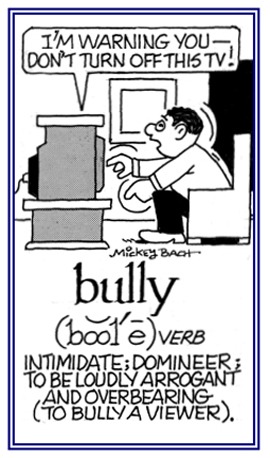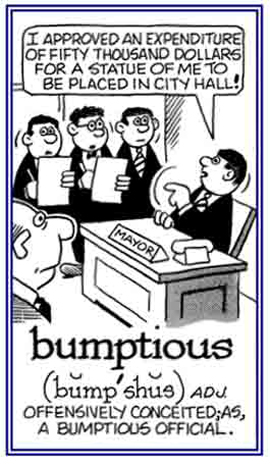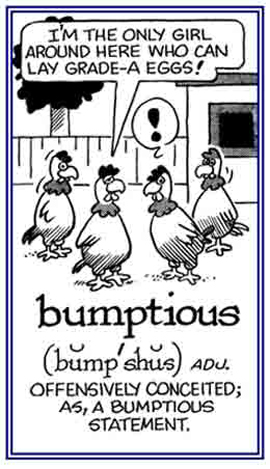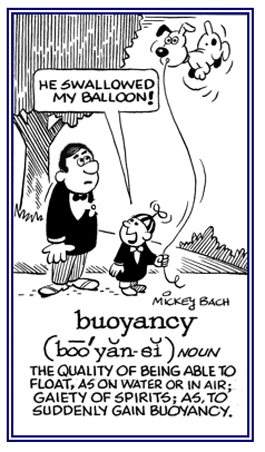English Words in Action, Group B
(a variety of English words which have developed through history and are currently used in our modern age)
Simply click on this banner (or the following link) and you will be on your way to stimulate your brain for greater word comprehension with quizzes based on some of the words in this unit.
Mark is known to bully his younger brother whenever they are doing something together.

Go to this Word A Day Revisited Index
so you can see more of Mickey Bach's cartoons.


Go to this Word A Day Revisited Index
so you can see more of Mickey Bach's cartoons.
2. Informal: any bed: Lisbeth's roommate shouted that she should grab a bunk before the other people came into the room.
3. A cabin used for sleeping quarters; such as, in a summer camp: At the summer campground, Hank slept in one of the bunks reserved for visitors.
4. A trough for feeding cattle: The farmer pitched some hay into the bunk for the cattle.
5. Etymology: bunk is probably a shortened form of bunker, which is Scotish for "a seat" or "a bench" and is of uncertain origin; possibly from a Scandinavian source; possibly from, Old Swedish, bunke, "boards used to protect the cargo of a ship" or from Scottish English, meaning "chest, box".
2. A sand-filled hollow on a golf course, built as a hazard: The golf champ hit his ball into the bunker and had difficulty getting it out.
3. A fuel-storage container on a ship: The bunker was filled with 25,000 liters of gelled fuel for the sea voyage.
4. A large outdoor bin or chest: Farmer Joe kept his summer picnic equipment in a bunker out by the barn.
5. Etymology: from Scottish, "seat, bench", possibly a variant of banker, "bench" (1677).
2. Etymology: Bunk is here a shortened form of bunkum, a phonetic spelling of Buncombe, a county in North Carolina.
During the extended Missouri statehood debates, on February 25, 1820, N.C. Representative Felix Walker started what promised to be a "long, dull, irrelevant speech", and he resisted calls to cut it short by saying he was bound to say something that could appear in the newspapers in his home district and prove that he was on the job.
"I shall not be speaking to the House," he confessed, "but to the people of Buncombe"; however, it soon became a term for "political wind-bagging" and took on the more general meaning of "nonsense" or "claptrap" (insincere and foolish talk).
Bunkum has been used in American English as a slang term for "nonsense" since at least 1847 and was popularized by Henry Ford's remark in 1916: "History is more or less bunk."

Go to this Word A Day Revisited Index
so you can see more of Mickey Bach's cartoons.
2. Etymology: From Old High German bouhhan, "buoy", and is elated to "beacon".
The term also exists in French bouee, Italian boia, and Spanish boya.
2. To inspire or to encourage: The football team was buoyed up for the game because they were all in good physical condition and they were convinced by their coach that they had a very good chance of winning the championship.
2. A upward force that a fluid exerts on something that is less dense than itself: Rubber rafts have a buoyancy that allows people to float even when they can't swim.
3. An ability to recover quickly from undesirable situations; such as, a failure or a disappointment: Matt was a man of remarkable buoyancy even though he was losing money in the stock market.
4. Lightness of spirit; cheerfulness: Carl had a great deal of buoyancy when he found out that his brother was able to get a good job after graduating from the university.
The buoyancy of the elderly couple, who were celebrating their sixty-fifth wedding anniversary, was an indication that they were very happy.


Go to this Word A Day Revisited Index
so you can see more of Mickey Bach's cartoons.
2. Pertaining to something that can cause things to drift in the air: Warm air is more a buoyant factor than cool or cold air. 3. Descriptive of being happy and confident: The two basketball teams were in a buoyant mood as they were about to play their game.
4. Relating to remaining at a regular or high level: The investors are convinced that there will be a buoyant economy in the near future.

Go to this Word A Day Revisited Index
so you can see more of Mickey Bach's cartoons.
The market for cell phones is burgeoning on a global scale.
One of the dangers of so much rain and heat is that mosquito population is burgeoning and causing more health problems.
The nation's burgeoning number of people without jobs has been increasing and causing serious financial problems.
Links to all of the groups of English words in action, Groups A to Z.
You may see the bibliographic list of sources of information for these words in action.

